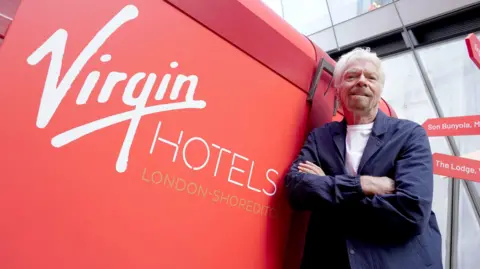In a recent statement, distinguished entrepreneur Sir Richard Branson publicly criticized the tariffs implemented during Donald Trump’s presidency, acknowledging their damaging effects on global commerce. This commentary came during the launch event for a new Virgin Group hotel located in the vibrant neighborhood of Shoreditch, London. Branson asserted that despite the challenges posed by Brexit and these tariffs, the UK remains an exceptional environment for entrepreneurial ventures.
At 74 years old, Branson, known for his dynamic business approach, emphasized the prevailing uncertainty stemming from Trump’s policy decisions on trade. During his address, he expressed a belief that business leaders need to navigate the complexities introduced by such tariffs. Despite these hurdles, he rooted for the potential of starting businesses in the UK, underscoring that a robust entrepreneurial ecosystem can lead to increased revenue for public services, which could consequently lower taxes for individuals.
As Branson reflected on the current business landscape, he noted the unfortunate repercussions of Trump’s tariffs, stating that they have brought about significant disruption. He reassured attendees of the launch that the UK continues to be a unique and stable location for starting businesses, despite the broader geopolitical challenges presented by events like Brexit. His optimistic stance underscored a belief that the entrepreneurial spirit could overcome these hurdles, contributing to London’s economic revitalization and prosperity.
Branson’s remarks also touched upon the international perspective on Trump’s tariffs, particularly in relation to how they influenced global market dynamics. He articulated his view that Trump experienced a harsh realization, as the repercussions of his trade policies brought adverse reactions from the international community. Referring to the unpredictability surrounding Trump’s administration, Branson lamented that this has created confusion and concern within the business world, ultimately impeding growth and stability.
Looking to the future, Branson expressed his desire for more sensible trade policies and a predictable business environment. He noted that the unpredictability emanating from the former U.S. president’s administration caused turmoil and uncertainty that significantly impacted global markets over the recent months. Branson’s insights reflect a broader sentiment shared by many in the business community: a desire for clarity and stability in international trade relations, which he believes is vital for economic progress.
Adding to the conversation on local economic resilience, James Bermingham, the Chief Executive of Virgin Hotels, expressed confidence in the fortitude of Londoners amidst challenging times. He remarked that London consistently demonstrates its ability to rebound from crises and that such resilience sets a global standard. Bermingham suggested that the potential implementation of a tourist tax could be beneficial to the city’s infrastructure and overall visitor experience, provided it is reasonable and industry-led.
In a digital age where social media serves as the backdrop for public dialogue, Branson’s criticisms of Trump’s tariffs resonate with many stakeholders who are affected by international trade decisions. His perspective aligns with the concerns of businesspeople globally, who increasingly advocate for cooperative policies that transcend borders and enhance economic growth.
As the UK continues to adapt to its post-Brexit reality, the conversations led by influential figures like Branson emphasize the necessity for collaboration, innovation, and a shared vision for a prosperous economic future. While the challenges posed by tariffs and geopolitical changes may seem daunting, Branson remains hopeful that entrepreneurship can pave the way to a thriving economy and a better Britain for all.



